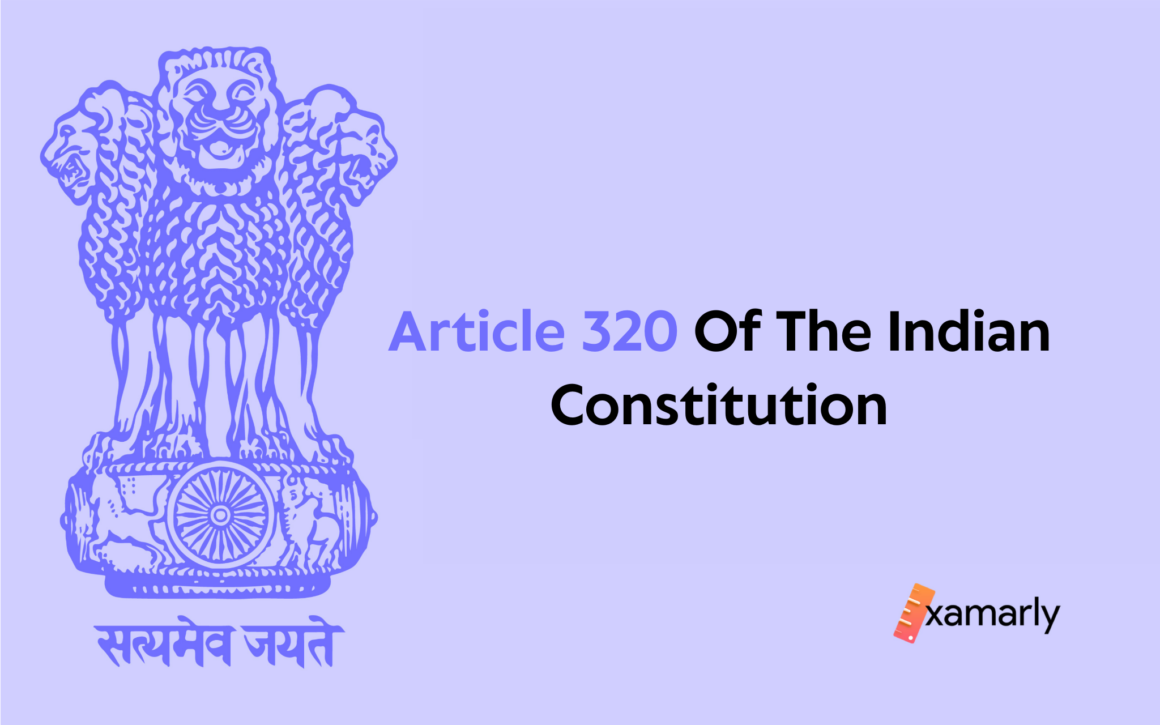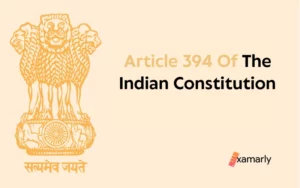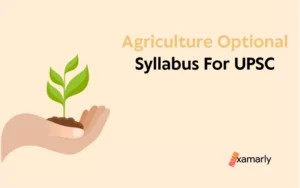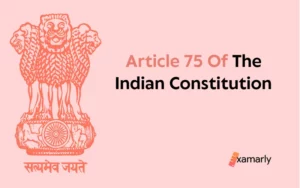Article 320 of the Indian Constitution pertains to the powers & functions of the Union & State Public Service Commissions (PSC).
It specifies the functions and responsibilities of the Union & the State Public Service Commissions, which are the constitutional bodies responsible for recruiting candidates to various civil service positions in the Indian government.
Article 320 states that the Union & State Public Service Commissions shall have the power to conduct examinations for appointments to the civil services, and to advise the President or the Governor, respectively, on disciplinary matters related to the civil services.
It also gives the UPSC the power to review the recruitment and promotion policies of the government, and to make recommendations on any changes that may be necessary.
In addition, Article 320 gives the President/Governor the power to consult the PSC on any matter relating to the civil services, and to require the Commission to furnish any report that the President/Governor may consider necessary.
This article also provides for the appointment, promotions, transfers, disciplinary matters & injuries of the members of the PSC.
Let us dive deep to get a thorough understanding of Article 320 of the Indian Constitution.
- Article 320 Of The Indian Constitution – In Detail
- Clause 1 – Quoted & Explained
- Clause 2 – Quoted & Explained
- Clause 3 – Quoted & Explained
- Clause 4 – Quoted & Explained
- Clause 5 – Quoted & Explained
- Summary
- FAQs on Article 320 of The Indian Constitution
- What is the purpose of Article 320 of the Constitution of India?
- What is the role of the Union Public Service Commission (UPSC)?
- What is the role of the State Public Service Commissions (SPSCs)?
- Can the President or Governors make regulations specifying cases in which it is not necessary to consult the UPSC or SPSCs?
- Who appoints the members of the UPSC and SPSCs?
Article 320 Of The Indian Constitution – In Detail
Let us analyse the clauses mentioned in Article 320 of the Indian Constitution one by one to have a better understanding of it.
Clause 1 – Quoted & Explained
1. It shall be the duty of the Union and the State Public Service Commissions to conduct examinations for appointments to the services of the Union and the services of the State respectively.
The first clause of Article 320 of the Indian Constitution states that it is the responsibility of the Union Public Service Commission (UPSC) and the State Public Service Commissions (SPSCs) to hold exams to select candidates for government jobs at the national and state levels, respectively.
The UPSC is responsible for recruiting candidates for civil service positions in the Indian government, while the SPSCs are responsible for recruiting candidates for state-level government jobs.
Clause 2 – Quoted & Explained
2. It shall also be the duty of the Union Public Service Commission, if requested by any two or more States so to do, to assist those States in framing and operating schemes of joint recruitment for any services for which candidates possessing special qualifications are required.
The second clause of Article 370 of the Indian Constitution mentions that the Union Public Service Commission (UPSC) has the responsibility to help any two or more states in designing, implementing & operating joint recruitment schemes for government jobs that require specialised qualifications, if requested to do so by the states.
In other words, the UPSC has the authority to assist states in recruiting candidates with particular expertise or training for special qualifications in government positions.
This provision allows the UPSC to lend its expertise and resources to states in order to facilitate the recruitment process for specialised roles.
Clause 3 – Quoted & Explained
3. The Union Public Service Commission or the State Public Service Commission, as the case may be, shall be consulted—
- on all matters relating to methods of recruitment to civil services and for civil posts;
- on the principles to be followed in making appointments to civil services and posts and in making promotions and transfers from one service to another and on the suitability of candidates for such appointments, promotions or transfers;
- on all disciplinary matters affecting a person serving under the Government of India or the Government of a State in a civil capacity, including memorials or petitions relating to such matters;
- on any claim by or in respect of a person who is serving or has served under the Government of India or the Government of a State or under the Crown in India or under the Government of an Indian State, in a civil capacity, that any costs incurred by him in defending legal proceedings instituted against him in respect of acts done or purporting to be done in the execution of his duty should be paid out of the Consolidated Fund of India, or, as the case may be, out of the Consolidated Fund of the State;
- on any claim for the award of a pension in respect of injuries sustained by a person while serving under the Government of India or the Government of a State or under the Crown in India or under the Government of an Indian State, in a civil capacity, and any question as to the amount of any such award,
and it shall be the duty of a Public Service Commission to advise on any matter so referred to them and on any other matter which the President, or, as the case may be, the Governor of the State, may refer to them:
Provided that the President as respects the all- India services and also as respects other services and posts in connection with the affairs of the Union, and the Governor, as respects other services and posts in connection with the affairs of a State, may make regulations specifying the matters in which either generally, or in any particular class of case or in any particular circumstances, it shall not be necessary for a Public Service Commission to be consulted.
The third clause of Article 370 of the Indian Constitution states that the Union Public Service Commission (UPSC) and the State Public Service Commissions (SPSCs) shall be consulted on a range of matters related to the recruitment, promotion, transfer, and discipline of civil servants in the Indian government.
These matters include:
- Methods of recruitment,
- Principles for making appointments and promotions,
- Disciplinary matters,
- Claims for payment of legal costs,
- Awards of pensions, and
- Any other matters referred to the Commission by the President or Governor of a state.
The UPSC is responsible for advising on these matters for the all-India services and other services and posts related to the affairs of the Union, while the SPSCs are responsible for advising on matters related to the affairs of the state.
The President and Governor have the authority to make regulations specifying cases in which it is not necessary to consult the Commission.
Clause 4 – Quoted & Explained
4. Nothing in clause (3) shall require a Public Service Commission to be consulted as respects the manner in which any provision referred to in clause (4) of article 16 may be made or as respects the manner in which effect may be given to the provisions of article 335.
The fourth clause of Article 320 of the Indian Constitution clarifies that the Union Public Service Commission (UPSC) and the State Public Service Commissions (SPSCs) are not required to be consulted on matters related to the implementation of certain provisions specified in Article 16(4) and Article 335 of the Constitution of India.
Article 16(4) deals with the reservation of appointments or posts in favour of any backward class of citizens, while Article 335 pertains to the claims of the members of the Scheduled Castes and Scheduled Tribes for admission to educational institutions and for appointments to public services.
Clause 5 – Quoted & Explained
5. All regulations made under the proviso to clause (3) by the President or the Governor of a State shall be laid for not less than fourteen days before each House of Parliament or the House or each House of the Legislature of the State, as the case may be, as soon as possible after they are made, and shall be subject to such modifications, whether by way of repeal or amendment, as both Houses of Parliament or the House or both Houses of the Legislature of the State may make during the session in which they are so laid.
This provision states that all regulations made by the President or Governor of a state under the condition to clause (3) of Article 320 must be presented to the Parliament or the state legislature for a minimum of 14 days before they can take effect.
The regulations which specify cases in which it is not necessary to consult the Union Public Service Commission (UPSC) or the State Public Service Commissions (SPSCs) on certain matters, can be modified or repealed by Parliament or the state legislature during the session in which they are presented.
You Might Also Like To Read – Article 270 Of The Indian Constitution
Summary
The Union Public Service Commission (UPSC) and State Public Service Commissions (SPSCs) have the duty to conduct exams for appointments to the civil services.
They are also empowered to advise the President and Governors of states on matters related to recruitment, promotion, transfer, and discipline of civil servants for the posts in connection.
FAQs on Article 320 of The Indian Constitution
What is the purpose of Article 320 of the Constitution of India?
Article 320 of the Constitution of India pertains to the powers and responsibilities of the Union Public Service Commission (UPSC) and the State Public Service Commissions (SPSCs).
It specifies the functions of these constitutional bodies, which are responsible for recruiting candidates for civil service positions in the Indian government and advising the President and Governors on matters related to the recruitment, promotion, transfer, and discipline of civil servants.
What is the role of the Union Public Service Commission (UPSC)?
The UPSC is a constitutional body responsible for conducting examinations for appointments to the civil services and advising the President on disciplinary matters related to the civil services.
It also has the power to review the recruitment and promotion policies of the government and to make recommendations for any necessary changes.
The President has the authority to consult the UPSC on any matter relating to the civil services and to require the Commission to furnish any report that the President may consider necessary.
What is the role of the State Public Service Commissions (SPSCs)?
The SPSCs are responsible for conducting examinations for appointments to the state civil services and advising the Governors of states on matters related to the recruitment, promotion, transfer, and discipline of civil servants.
They also have the power to review the recruitment and promotion policies of the state government and to make recommendations for any necessary changes.
The Governors have the authority to consult the SPSCs on any matter relating to the state civil services and to require the commissions to furnish any necessary reports.
Can the President or Governors make regulations specifying cases in which it is not necessary to consult the UPSC or SPSCs?
Yes, the President and Governors have the authority to make regulations specifying cases in which it is not necessary to consult the UPSC or SPSCs on certain matters.
However, these regulations must be presented to the Parliament or the state legislature and are subject to modification or repeal.
Who appoints the members of the UPSC and SPSCs?
The President appoints the members of the UPSC, while the Governors of the respective states appoint the members of the SPSCs.
The appointments are made in accordance with the procedures specified in Article 320 of the Indian Constitution.






